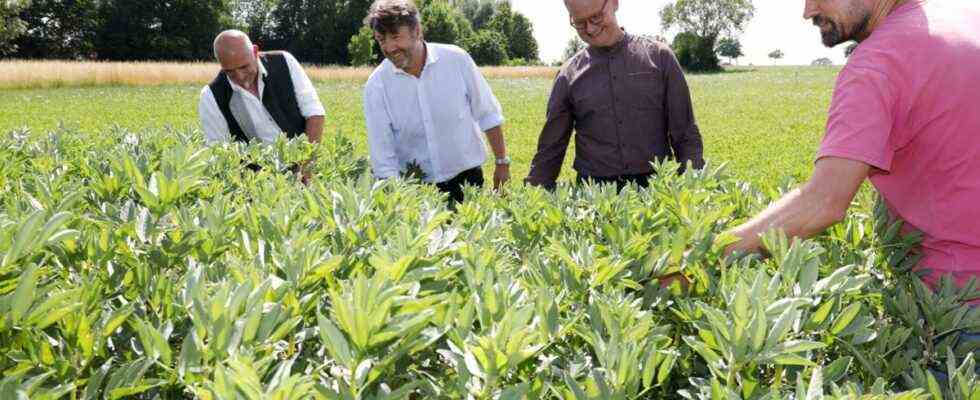Coffee, the basis for spreads or meat substitute products, healthy snacks and, at some point, Bavarian falafel – to grow the right plants such as lupins, chickpeas or field beans in Bavaria is one of the goals of the Bavarian Agricultural Institute (LfL). Stephan Sedlmayer, President of the LfL, explains this on Monday during a tour of the LfL test station in the Fürstenfeldbruck district of Puch.
The more people wanted to eat less or no animal food, the more important the vegetable protein suppliers would be, explains Klaus Wiesinger, coordinator of the LfL Competence Center for Organic Agriculture. Farmers could also get higher prices for food for humans than for animal feed. “But the requirements are also higher,” he says.
You need chickpeas for falafel.
(Photo: Catherina Hess)
Marianne Heidner, Deputy Head of the Office for Food, Agriculture and Forests Fürstenfeldbruck (AELF), knows from her professional experience that legumes are becoming increasingly important as a source of protein in human nutrition. Finally, nutrition courses for housekeepers are also held at the AELF. Chickpeas from organic cultivation in the region instead of from overseas – she thinks that is a good thing, says Heidner.
How one can grow protein plants in Bavaria, in organic quality and with profitable yield, that is what the LfL is testing in Puch and at the research station in Landberg am Lech. This year, fodder peas, field beans, white lupines and blue lupines are grown in Puch, and chickpeas in Landsberg am Lech. “An interesting, new culture,” says Sedlmayer. “But is the chickpea even suitable for Bavarian standards?” Among other things, it was important to find out.
Bavarian farmers have not yet been able to gain sufficient experience with the organic cultivation of these crops. The LfL therefore tries out for you which crops grow in which soil and how. It also examines when the best time for sowing is, how and with what is the best fertilizer, how to work the soil. To do this, the same varieties are sown in small fields, but tended differently. The seeds must be sown early enough so that the legumes are still ripe, but not too early so that the sensitive young plants do not suffer from late frosts or the increasingly frequent April drought.
The lupine flower nourishes a bumblebee.
(Photo: Birgit Gleixner / LFL / oh)
At the organic field day, farmers can examine the results on the spot, and laypeople can also obtain information. Due to the corona, the field day does not take place on one date this year, but lasts a whole month, until next Sunday. At the press conference, Peer Urbatzka, who is responsible for organic crop production at LfL, explains the differences in detail. Anyone who comes alone to the test fields north of Puch will find information material and QR codes that lead to the corresponding LfL pages. They have already been clicked hundreds of times, says Wiesinger.
Hubert Heigl, chairman of the regional association for organic farming in Bavaria (LVÖ) and organic farmer since 1991, welcomes the “transfer of knowledge from science to agriculture”, as he says. Heigl also points out that the biodiversity on organic farms is much higher than on conventional farms. In Puch you can experience this well: butterflies, bumblebees and other insects buzz around the plants, settle on the lupine blossoms to drink.
Ralf Huber, District President of the Bavarian Farmers’ Association and also organic farmer, is pleased that LfL President Sedlmayer has come to the appointment. “That shows me that organic farming is a top priority at LfL,” he says, and immediately calls for more support from organic farmers. In 2030, nine years from now, the state government wants a third of Bavarian farmers to operate organically. But that can only be done with the appropriate financial support for agricultural subsidies. “Then every third euro has to flow into organic farming,” demands Huber.

